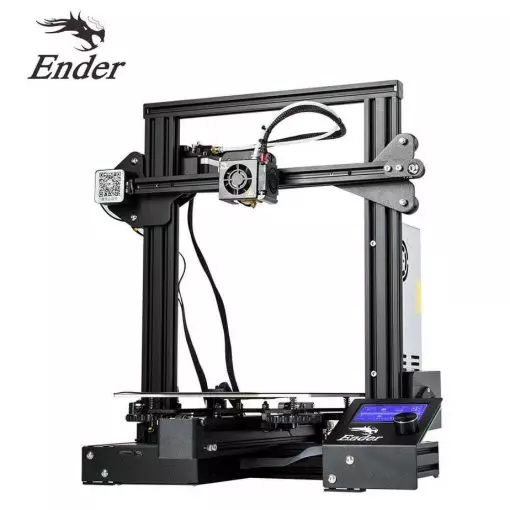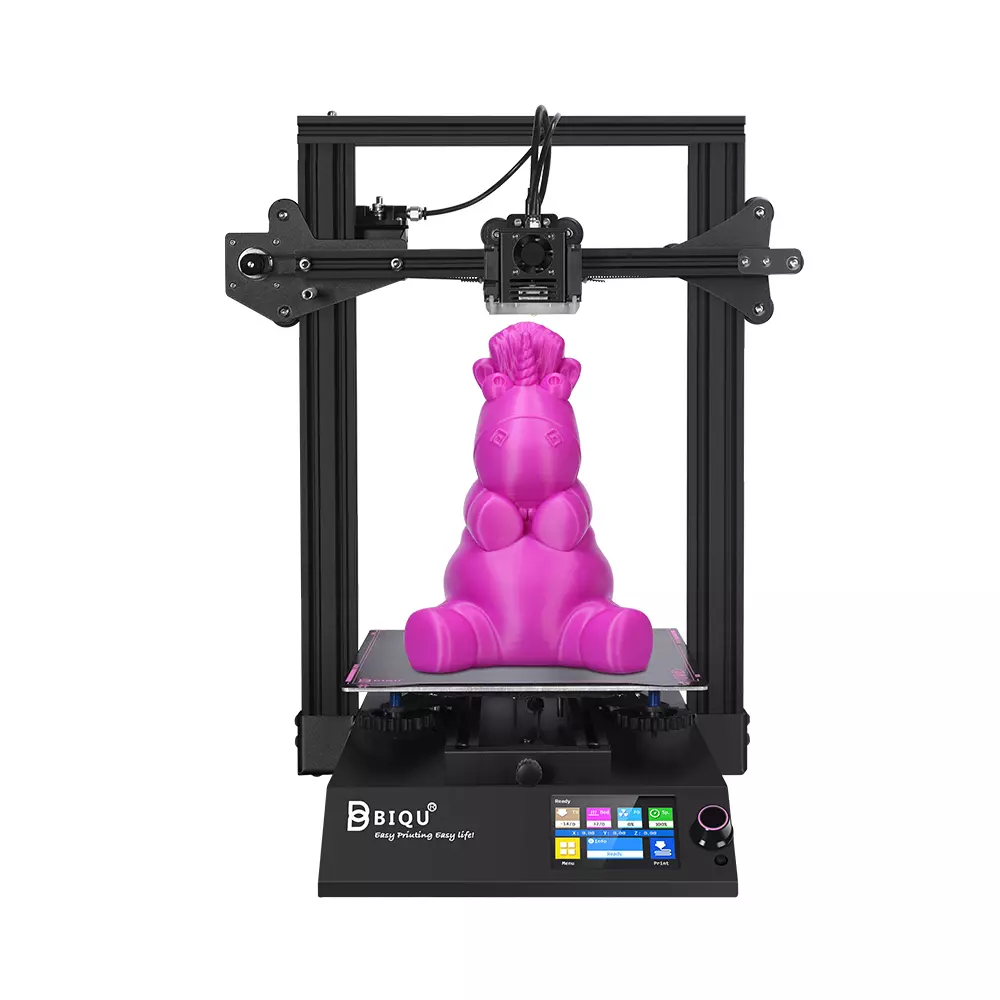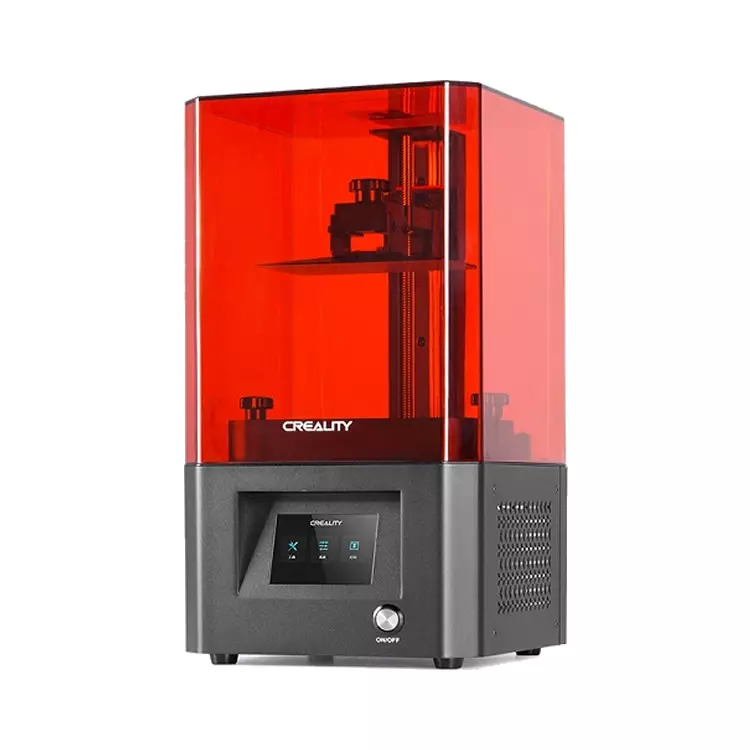Compare Ender 3 vs BIQU B1 vs LD0002H
Comparison between the best 3D printers
Choose the best 3D printer at the best price. The cheapest 3D printers are here.
Buy a 3D printer here with 3D Fila.
 |
 |
 |
|
| Model | Ender 3[BUY Ender 3] |
BIQU B1 |
LD0002H[BUY LD0002H] |
| Printing Material | Filament | Filament | Resin |
| Estimated price | $210,00 | $269,00 | $230,00 |
| Fabricante | Creality 3D | BigTreeTech | Creality 3D |
| Release Year | 2018 | 2020 | 2021 |
| Print Volume [mm] | 220x220x250 | 235x235x270 | 82x130x160 |
| Printer Size [mm] | 440x440x465 | 412x402x492 | 201x221x403 |
| Weight [kg] | 6,62 | 8,00 | 8,3 |
| Power Loss Recovery | NO | YES | NO |
| Maximum Resolution [mm] | 0,1 | 0,1 | 0,051 |
| Processor | 8 bits | 32 Bits BTT SKR V 1.4 | |
| Display | Mono | Touchscreen TFT 3,5'' | Touchscreen TFT 3,5'' |
| Power Supply | 24V / 270W | 24V / 360W | 40W |
| Connectivity | SD / USB | SD / USB | SD |
| Operating systems | Windows, Mac, Linux | Windows, Mac, Linux | Windows, Mac, Linux |
| Date of registration in the system | 2021-04-13 | 2021-04-14 | 2021-04-15 |
| Release date | 2018 | 2020 | 2021 |
| Extra features | The Ender 3 V1 is a DIY assembly 3D printer, a sales leader since 2017, standing out for its cost-benefit. With a wide printing capacity, it has a CNC machined structure for precision and stability. It offers high-precision prints with low noise, thanks to its innovative V-profile and pulleys. It has a self-adhesive magnetic platform for easy removal of models and excellent adhesion. The Ender 3 heats up quickly, reaching 100°C in 5 minutes, ideal for agile prints. It includes protection against power failures, allowing you to resume printing after interruptions, saving time and material. | The BIQU B1 is an advanced 3D printer with a silent 32-bit BTT SKR V1.4 motherboard and ARM Cortex-M3 CPU, offering DIY interfaces (I2C, SPI, WiFi) and dual Z-axis. Its dual BTT B1 TFT35 V3.0 operating system allows real-time monitoring and multiple printing modes, including G-code visualization effects. It stands out for its BIQU SSS (Super Spring Steel), ensuring easy model adhesion and simplified removal, with the possibility of using it on both sides. It includes a filament sensor, automatically pausing printing in case of filament breakage. The multicolored RGB lights integrated into the hotend allow you to view the printing status even at night. Additional notes include the need for a BIQU-specific Type-C cable and extra interfaces for smart filament sensor and BL Touch. | The Creality LD-002H stands out with its 130 x 82 x 160 mm print volume and 2K monochrome screen, increasing print speed and detail. It includes an air filtration system, a metalized print plate for better adhesion, and compatibility with the ChiTuBox slicer. With an intuitive touchscreen interface and linear guide on the Z axis, it ensures precision and ease of use. |
| Support for multiple colors and materials (AMS and CFS) | NO | NO | NO |
Notes * |
|||
| Cost-benefit | 6 / 10 | 7 / 10 | 8 / 10 |
| Hardware | 0.5 / 10 | 2 / 10 | 0.5 / 10 |
| Screen | . | . | . |
| Print volume | 3 / 10 | 3 / 10 | 3 / 10 |
| Performance | 1 / 10 | 1 / 10 | 9 / 10 |
| [BUY Ender 3] | [BUY LD0002H] |
Conclusion |
| In comparing the three 3D printers—Ender 3, BIQU B1, and LD-002H—each model presents distinct advantages and limitations, catering to different user needs and budget considerations. The Ender 3, being the most affordable, is well-regarded for its cost-benefit ratio and offers a commendable print volume along with a reliable build quality, making it a solid choice for beginners and hobbyists. However, it lacks features like power loss recovery, which could be a drawback for users focused on uninterrupted printing. The BIQU B1, while mid-priced, stands out due to its advanced features, including a dual Z-axis setup and a color touchscreen display. Its silent operation and smart filament sensor enhance usability, making it suitable for more experienced users seeking a blend of performance and convenience. However, its print volume is slightly larger than that of the Ender 3, yet it does not significantly improve performance for those requiring larger prints. The LD-002H, although positioned at a similar price point to the Ender 3, is specifically designed for resin printing, offering higher resolution and quicker print speeds, which are ideal for intricate details and smaller models. If users prioritize precision over print volume, this printer would be an excellent choice. Nonetheless, it has a significantly smaller print volume than the others, which might limit its versatility for larger projects. In conclusion, the choice between these three models ultimately depends on individual needs—whether seeking a budget-friendly option (Ender 3), a feature-rich experience (BIQU B1), or high-resolution capabilities for detailed miniatures (LD-002H). The best printer will vary according to what parameters are most important to the user, including price, print volume, and specific application requirements. |

